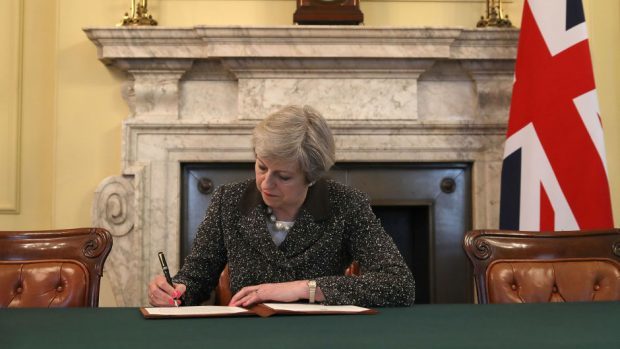Theresa May declared there could be “no turning back” as she hailed the formal launch of Brexit negotiations nine months after the UK voted to leave the European Union.
The prime minister called the handover of the official letter triggering Article 50 a “great national moment”.
But she also warned the process would require “a great national effort” as she urged people and parties to “come together”.
Sir Tim Barrow, British ambassador to the EU, delivered the correspondence confirming the UK’s intention to leave just before 12.30pm.
Minutes after European Council president, Donald Tusk, confirmed receipt, Mrs May rose in the Commons to share the news with MPs.
The Tory leader said she chose to “believe in Britain and that our best days lie ahead”.
She added: “Leaving the EU presents us with a unique opportunity. It is this generation’s chance to shape a brighter future for our country.”
But Mr Tusk said it was not “a happy day” for him or the EU, adding: “We already miss you. Thank you and goodbye.”
Labour leader, Jeremy Corbyn, said that everyone had an interest in a good deal.
He challenged the prime minister to deliver a trade agreement that would bring the same benefits as current membership of the single market.
And he insisted that to unite the country, Mrs May had to “listen to, consult and represent” everyone – not just the “hard-line Tory ideologues”.
He added: “More than ever, Britain needs a government that will deliver for the whole country, not just the few – and that is the ultimate test of the Brexit deal that the prime minister must now secure.”
SNP Westminster leader, Angus Robertson, said on this issue, the UK was “not a united kingdom”, pointing to the 62% Remain vote in Scotland.
And he urged the prime minister to “respect the differences” around the country, warning she would make Scottish independence “inevitable” otherwise.
Mr Corbyn’s predecessor Ed Miliband added that national unity had to be “earned and not just asserted”.
Mrs May repeatedly said yesterday and set out in the letter her desire to secure a “deep and special” partnership with the EU.
And she pledged to work “constructively” and in “a spirit of sincere cooperation” to secure the terms of a future deal alongside those of the UK’s withdrawal within the two-year timetable.
Striking a more conciliatory tone than previously, she added: “Perhaps now more than ever, the world needs the liberal, democratic values of Europe – values that the UK shares.
“While we are leaving the institutions of the EU, we are not leaving Europe.
“We will remain a close friend and ally. We will be a committed partner.
“We will play our part to ensure that Europe is able to project its values and defend itself from security threats – and we will do all that we can to help the EU prosper and succeed.”
There was, however, an implied threat in the letter that failure to secure a deal would lead to “weakened” cooperation in the fight against crime and terrorism.
Meanwhile, a draft resolution of the European Parliament, expected to be debated next month, said a new trade deal could only be struck once the UK had left the EU.
It also stressed any transitional agreement should last no more than three years after 2019, the expected departure date after 46 years of membership.
Mrs May said immigration would be controlled but that she would seek to guarantee the rights of EU nationals living in the UK and vice versa “as early as we can”.
She also promised to pursue a “bold and ambitious” free trade agreement with the EU allowing for the “freest possible trade in goods and services”.
